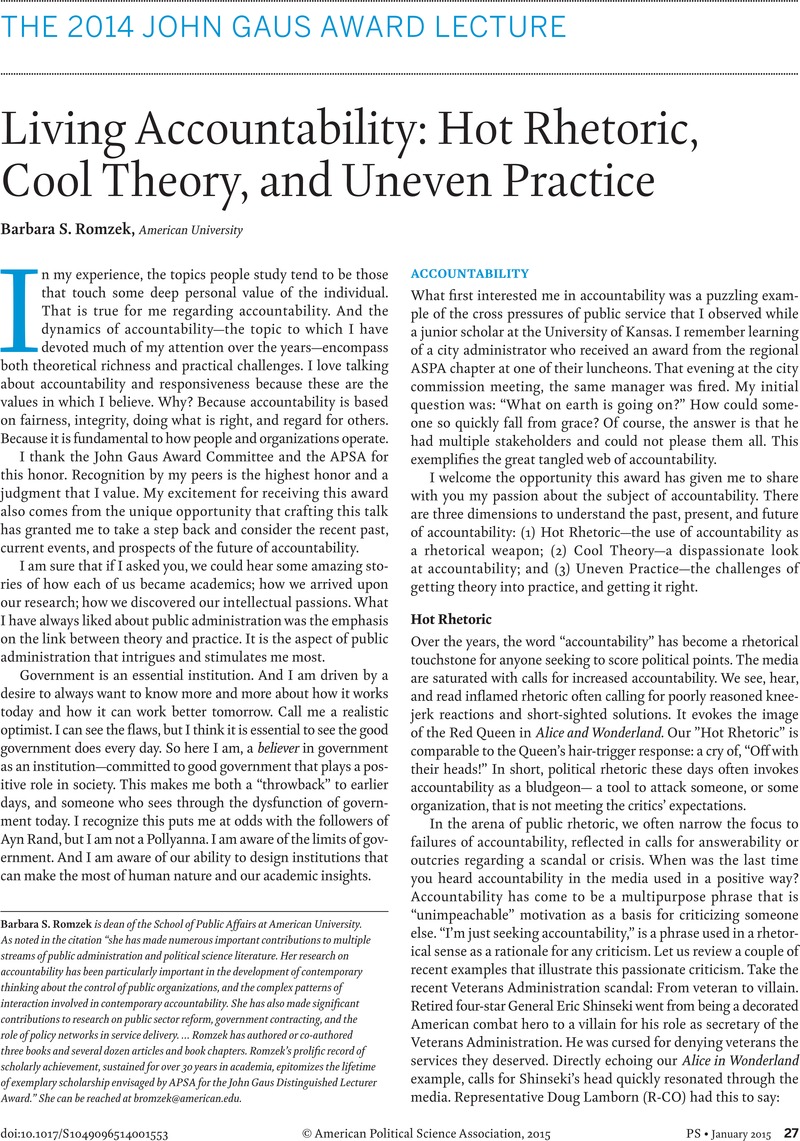Crossref Citations
This article has been cited by the following publications. This list is generated based on data provided by Crossref.
García-Juanatey, Ana
Jordana, Jacint
and
Sancho, David
2017.
Administrative Innovations and Accountability Failures: The Termination of the Spanish Telecommunications Agency.
South European Society and Politics,
Vol. 22,
Issue. 3,
p.
385.
Durant, Robert F.
and
Rosenbloom, David H.
2017.
The Hollowing of American Public Administration.
The American Review of Public Administration,
Vol. 47,
Issue. 7,
p.
719.
Bromberg, Daniel E.
Charbonneau, Étienne
and
Smith, Andrew
2018.
Body‐Worn Cameras and Policing: A List Experiment of Citizen Overt and True Support.
Public Administration Review,
Vol. 78,
Issue. 6,
p.
883.
Khan, Haroon A.
2018.
Globalization and the Challenges of Public Administration.
p.
101.
Whiteley, Paul
and
Kölln, Ann-Kristin
2019.
How do different sources of partisanship influence government accountability in Europe?.
International Political Science Review,
Vol. 40,
Issue. 4,
p.
502.
Hwang, Kwangseon
and
Han, Yousueng
2020.
Exploring the Sources of Cognitive Gap Between Accountability and Performance.
Public Personnel Management,
Vol. 49,
Issue. 3,
p.
393.
Piatak, Jaclyn S.
and
Holt, Stephen B.
2021.
Public Service Motivation and Public Opinion.
Goodman, Julia
Pearson, Hayley
and
Mthombeni, Morris
2021.
Sources of accountability inside the boardroom.
European Business Review,
Vol. 33,
Issue. 4,
p.
667.
Reichersdorfer, Johannes
2023.
Accountability: A Battleground for Legitimacy – A Case Study of Decision-Making in Germany’s Third Grand Coalition.
German Politics,
p.
1.
Yusrawati
Tatik Mariyanti
and
Hatta, Zulhelmy M.
2023.
The influence of internal control, religiosity and organizational commitment on Amil's performance with accountability as an intervening variable in the zakat management organization (ZMO) in Riau province.
International Journal of Research in Business and Social Science (2147- 4478),
Vol. 12,
Issue. 9,
p.
60.
Brandling, Tarryn
Pearson, Hayley
and
Mthombeni, Morris
2023.
Exploring accountability of individuals in the mining sector: A multi-level perspective.
South African Journal of Business Management,
Vol. 53,
Issue. 1,
Langvatn, Silje Aa.
and
Holst, Cathrine
2024.
Expert accountability: What does it mean, why is it challenging—and is it what we need?.
Constellations,
Vol. 31,
Issue. 1,
p.
98.
Chowdhury, Silvia
2024.
Equity and Sustainability.
p.
43.



